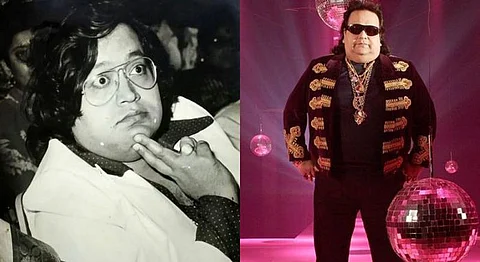Disco King, Believer, & More: All The Memories Bappi Lahiri Left Us With
For every genre of art popularised in India, there exists an individual that stood behind its rise. It goes without saying, that for disco, it was Bappi Lahiri who the nation lovingly called ‘Bappi da’.
The likes of Jawani Janeman from Namak Halaal (1982) and the near-epitome of disco in India, I Am A Disco Dancer from Disco Dancer (1982), are not merely tunes we bob our heads to - they are moments in time that signify shiny attire, the confidence of a superhuman, and dance moves that are busted out for joy and not performance.
At the age of 69, the Disco King passed away on 16 February 2022 as a result of his deteriorating health. We look back on his life with an unexplainable heaviness, but also with a load of thankfulness for all the times he put a smile on our faces, not just through his music, but simply by being himself.
The 1952-born musician made the ‘I-will-make-it-in-Bollywood’ move to Mumbai at the age of 19. His first stint was for the Hindi film, Nanha Shikari (1973). In the early 80s, as Bappi da began to find his footing not only in Bollywood, but also in the genre of music that felt true to him, he began to put out hit after hit. The now composer, music director, producer, and performer had begun to churn out irresistible music like Hari Om Hari from Pyara Dushman (1980) and Ramba Ho Samba Ho from Arman (1981).
It is easy to list out his record hits, the laurels to his name, the feathers in his hat – all this is public knowledge. What struck us as peculiar about him was in fact, all that contributed to his vibrant personality. The gold-clad, long-haired man behind the big shades was responsible for a nationwide disco movement. Perhaps, there are several individuals who can say they introduced a whole country to a genre of music, but how many can say they made them all fall in love with it? I don’t mean a simple ‘I’m-fond-of-this-song’ type of love, I mean the kind that makes you want to turn the volume way up, get off the couch, drag a friend to the pretend dance floor, and lay down a few (maybe badly executed) disco moves.
Tracks like Jimmy Jimmy and Jhoom Baba remind us of the power he held to incite the feeling of youthfulness. From an elderly person to the youngest of children in the room, everyone is coerced up on their feet to shake a leg. His voice was like a disco signature, now etched in history as India’s pioneer of disco. As rightly pointed out by Bappi da himself, “Music is my soul and I can easily say, it is the secret of my youth.”
His belief in his gold pendants and his blessings were a strong bond. In fact, he even refused to part with one of his pendants when the legend Michael Jackson asked for it, saying, “He has everything, I have only this.”
A homage to Bappi da is perhaps enough to capture his contributions to this music industry but insufficient to thank him for all that he gave the Indian population – fleeting moments of joy, excitement, and memories that people reminisce years after they have been created.
If you enjoyed reading this, we suggest you also read:


